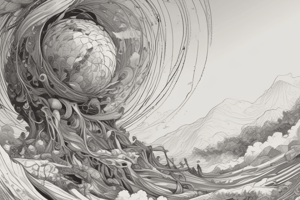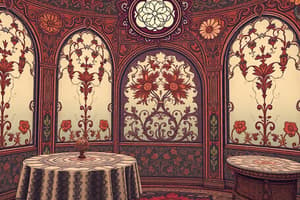Podcast
Questions and Answers
What principle of art is described as a large difference between two things to create interest and tension?
What principle of art is described as a large difference between two things to create interest and tension?
- Proportion
- Contrast (correct)
- Harmony
- Unity
Which principle of art involves a regular repetition of elements to produce the look and feel of movement?
Which principle of art involves a regular repetition of elements to produce the look and feel of movement?
- Movement (correct)
- Balance
- Unity
- Contrast
What is the principle that refers to the uniform repetition of any of the elements of art or their combinations?
What is the principle that refers to the uniform repetition of any of the elements of art or their combinations?
- Balance
- Unity/Variety
- Pattern and Repetition (correct)
- Proportion
Which term describes the comparative relationship of one part to another in regards to size or quantity?
Which term describes the comparative relationship of one part to another in regards to size or quantity?
What aspect of color refers to its brightness or darkness?
What aspect of color refers to its brightness or darkness?
What does the term 'saturation' in relation to color refer to?
What does the term 'saturation' in relation to color refer to?
How do most contemporary artists use color in their artworks?
How do most contemporary artists use color in their artworks?
What can happen if there is too much unity in a work of art?
What can happen if there is too much unity in a work of art?
What does melody refer to in music?
What does melody refer to in music?
Which element focuses on how energy is directed through the dancer's body?
Which element focuses on how energy is directed through the dancer's body?
What is the role of the director in theater?
What is the role of the director in theater?
Which element is considered the most significant in film?
Which element is considered the most significant in film?
In music, what does dynamics refer to?
In music, what does dynamics refer to?
What does the term 'performance space' refer to in theater?
What does the term 'performance space' refer to in theater?
Which element in dance relates to the area where the dance is performed?
Which element in dance relates to the area where the dance is performed?
What is involved in camera movement in filmmaking?
What is involved in camera movement in filmmaking?
What aspect does VALUE refer to in the context of art?
What aspect does VALUE refer to in the context of art?
How does TEXTURE primarily engage the viewer?
How does TEXTURE primarily engage the viewer?
Which artist is known for echoing the color scheme of Mindanao’s material culture?
Which artist is known for echoing the color scheme of Mindanao’s material culture?
What type of shapes are executed with mathematical precision in local textiles?
What type of shapes are executed with mathematical precision in local textiles?
What does 'Composition in Space' refer to?
What does 'Composition in Space' refer to?
Which movement is characterized by soaring movements defying gravity?
Which movement is characterized by soaring movements defying gravity?
In what form can movement be expressed in two-dimensional design?
In what form can movement be expressed in two-dimensional design?
What type of texture is associated with fabrics like the barong and baro’t saya?
What type of texture is associated with fabrics like the barong and baro’t saya?
What artistic element does Carlos Francisco's mural primarily convey?
What artistic element does Carlos Francisco's mural primarily convey?
Which element of traditional Asian dance is emphasized?
Which element of traditional Asian dance is emphasized?
What aspect of literature defines prose?
What aspect of literature defines prose?
What does imagery in literature primarily trigger?
What does imagery in literature primarily trigger?
Which of these best describes the theme of a composition?
Which of these best describes the theme of a composition?
What does the style of a literary work refer to?
What does the style of a literary work refer to?
What distinguishes the rhythm in a written composition?
What distinguishes the rhythm in a written composition?
What is a defining characteristic of music according to the content?
What is a defining characteristic of music according to the content?
Flashcards are hidden until you start studying
Study Notes
Principles of Art
- Art principles organize elements to create balance, harmony, unity, rhythm, proportion, variety, emphasis, and movement.
- Contrast involves significant differences between two things to generate interest.
- Movement uses regular repetition of elements to create a sensation of motion.
- Pattern and Repetition characterize the uniform repetition of art elements.
- Unity and Variety balance together to create a pleasing composition; too much unity leads to monotony, while excessive variety results in chaos.
- Proportion refers to the comparative relationship of one part to another in terms of size or degree.
Elements of Color
- Color evokes experiences of warmth and cold, influenced by the quality of light and the environment.
- Hue relates to the light waves' vibrations that enter our eyes; varying saturation affects intensity.
- Value or tone indicates brightness or darkness; mixing hues with black darkens them, whereas mixing with white lightens them.
- Artists manipulate color schemes for representational or expressionist purposes to convey mood and atmosphere.
Value and Texture
- Value entails gradations of tone from light to dark, including the play of light on objects.
- Texture describes how objects feel, created by combining lines and can be actual (physical) or simulated (visual).
Shape
- Shape can be two-dimensional or three-dimensional, with stylized forms evident in local textiles.
- Examples of shapes include geometric precision in traditional crafts and varied forms in architecture.
Composition in Space
- Composition examines the relationship between figures and elements, organized according to principles like balance and rhythm.
- Notable works, like Guillermo Tolentino’s Bonifacio Monument, exemplify circular composition suited for their contexts.
Movement
- Movement in art can manifest through rhythm or dynamic line work and is related to how the eye is directed across the piece.
- Dance and cinema also utilize movement to create rhythms and compositions in space.
Literature
- Literature embodies the achievements of a culture, comprising prose and poetry as two primary forms.
- Poetry employs figurative language, imagery, sound, and rhythm to express feelings and ideas.
- Prose, distinct from poetry, encompasses informative and persuasive elements and relies on structure, characters, and themes for narrative flow.
Music
- Music arranges sounds for a cohesive composition, characterized by melody, rhythm (tempo, meter, pattern), harmony, and texture.
- Dynamics denote the loudness and softness of musical performance, while timbre represents the quality of sound from different instruments.
Dance
- Dance includes elements such as body movement, spatial awareness, energy dynamics, and the relationship between performers and stage settings.
Theater
- Theater is an art form depicting planned actions and emotions for an audience, characterized by performers, audience interaction, directorial oversight, performance space, and design elements.
Film
- Film combines sequences of moving pictures, emphasizing time, editing techniques, camera movement, and framing to create a balanced viewing experience.
Studying That Suits You
Use AI to generate personalized quizzes and flashcards to suit your learning preferences.




